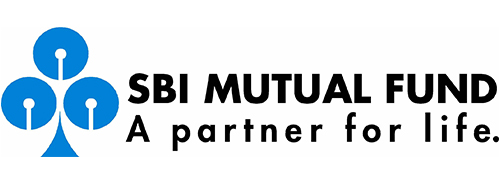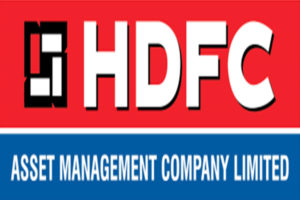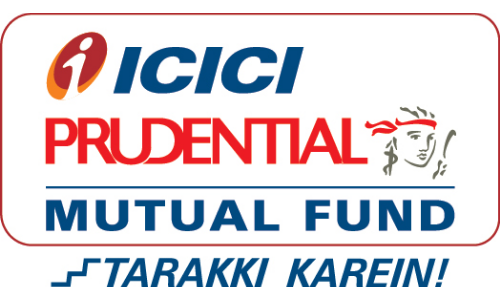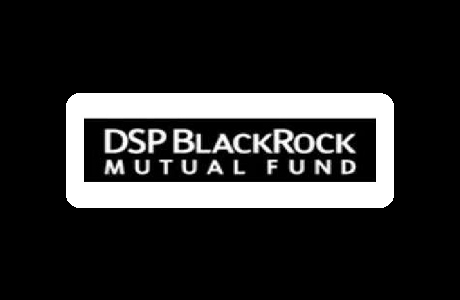Debt Mutual Funds
A debt fund invests in a fixed income instrument. It's a type of Mutual Fund that mainly invests in a mix of debt or fixed income securities like Government securities, Treasury bills, Corporate Bonds, etc. Debt funds are preferred by those who are looking for a steady income with relatively lower risks, as they are comparatively less volatile than equities. To choose Best Debt Funds, investors should evaluate certain aspects such as- average maturity of the portfolio, credit quality of instruments, interest rate scenario and the expense ratio of the relevant debt funds. Also, before you invest, it is advisable for you to understand debt fund taxation since taxation is different on dividend and growth options, this affects the final debt fund returns.
Types Of Debt Mutual Fund
There are different types of debt Mutual Funds that invest in various fixed income securities like deposits, bonds, etc. Securities of Exchange Board of India (SEBI) introduced 16 new and broad categories in debt funds on 6th Octover 2017. This is to bring uniformity in similar schemes launched by the different Mutual Funds. SEBI wants to ensure that investors can find it easier to compare the products and evaluate the different options available before Investing in a scheme as per their needs, Financial goals and risk ability.
1. Overnight Fund
These are a debt scheme that will invest bonds that mature in a day. In other words, investment is done in overnight securities with a maturity of one day. This is a safe option for investors who want to park money without worrying about risks and returns.
2. Liquid Funds
Liquid Funds invest in short-term money market instruments such as treasury bills, commercial papers, term deposits, etc. They invest in securities that have a lower maturity period, usually less than 91 days. Liquid funds provide easy liquidity and are less volatile than the other types of debt instruments. Also, liquid fund's investment returns are better than that of a Savings Account.
3. Ultra Short Duration Funds
Ultra short duration funds invest in fixed income instruments which have a Macaulay duration between three to six months. Ultra short-term funds help investors avoid interest rate risks and also offer better returns compared to liquid debt funds. Macaulay duration measures how long it will take the scheme to recoup the investment
4. Low Duration Fund
The scheme will invest in debt and money market securities with a Macaulay duration between six to 12 months.
5. Money Market Fund
The money market fund invests in many markets such as commercial/treasury bills, commercial papers, Certificate of Deposit and other instruments specified by the Reserve Bank of India (RBI). These investments are a good option for risk-averse investors who want to earn good returns in short duration. This debt scheme will invest in money market instruments having a maturity up to one year.
6. Short Duration Funds
Short duration funds mainly invest in Commercial Papers, Certificate of Deposits, Money Market Instruments, etc, with a Macaulay duration of one to three years. They may provide a higher level of return than ultra-short-term and liquid funds but will be exposed to higher risks.
7. Medium Duration Fund
This scheme will invest in debt and money market instruments with a Macaulay duration of three to four years. These funds have an average maturity period that is longer than liquid, ultra-short and short duration debt funds.
8. Medium to Long Duration Fund
This scheme will invest in debt and money market instruments with a Macaulay duration of four to seven years.
9. Long Duration Fund
This scheme will invest in debt and money market instruments with a Macaulay duration greater than seven years.
10. Dynamic Bond Funds
Dynamic Bond Funds invest in fixed income securities consisting of varying maturity periods. Here, the fund manager decides on which funds they need to invest based on their perception of the interest rate scenario and future interest rate movements. Based on this decision, they invest in funds across various maturity periods of debt instruments. This mutual fund scheme is suitable for individuals who feel puzzled about the interest rate scenario. Such individuals can rely on the view of the fund managers to earn money through dynamic bond funds.
11. Corporate Bond Fund
Corporate bond funds are essentially a certificate of debt issued by major companies. These are issued as a way of raising money for businesses. This debt scheme mainly invests in the highest rated corporate bonds. The fund can invest a minimum 80 percent of its total assets in the highest-rated corporate bonds. Corporate bond funds are a great option when it comes to good return and low-risk type investment. Investors can earn a regular income which is usually higher than that of interest on your Fixed Deposits (FDs).
12. Credit Risk Fund
This scheme will invest in below the high-rated corporate bonds. The credit risk fund should invest at least 65 percent of its assets below the highest-rated instruments.
13. Banking and PSU Fund
This scheme predominantly invests in debt and money market instruments consisting of securities issued by entities such as Banks, Public Financial Institutions, Public Sector Undertakings. This option is considered to maintain an optimum balance of liquidity, safety, and yield.
14. Gilt Fund
This scheme invests in government securities issued by RBI. Government-backed securities include G-secs, treasury bills, etc. As the papers are backed by the government these schemes are relatively safer. Depending on their maturity profile, long-term Gilt Funds carry interest rate risks. For instance, the higher the maturity of the scheme the higher would be the interest rate risk. Gilt Funds will invest a minimum 80 percent of its total assets in government securities.
15. Gilt Fund with 10-year Constant Duration
This scheme will invest in government securities with a maturity of 10 years. 15. Gilt Fund with a 10-year Constant Duration will invest a minimum 80 percent in government securities.
16. Floater Fund
This debt scheme mainly invests in floating rate instruments, where the interest paid changes in order with the changing interest rate scenario in the debt market. Floater Fund will invest a minimum of 65 percent of its total assets in floating rate instruments.
Talk to our investment specialist
Why Should you Invest in Debt Mutual Funds?
Some of the benefits of investing in debt funds are:
- In debt funds, you can withdraw the required money from the investment at any point in time and can let the remaining money stay invested.
- Debt funds are considered to be an ideal investment for generating regular income. For example, choosing dividend payout can be an option for regular income.
- If you are planning to achieve short-term financial goals, then debt funds can be a good option. Recommended debt fund instruments for this plan are short-term, ultra-short term debt funds or liquid funds. In a short term investment, you need to ensure safety and liquidity which are well offered by debt funds.
- Since, debt funds largely invest in government securities, corporate debt and other securities like treasury bills, etc., they are not affected by equity market volatility.
- In debt funds, you can generate fixed income every month by starting a Systematic Withdrawal Plan (SWP is a reserve of SIP/STP) to withdraw a fixed amount on a monthly basis. Also, you can change the amount of the SWP when required.
Tips on How to Invest in Debt Funds or Bond Funds?
Before making an investment, it is important to get a thorough idea of the respective investing instrument, whether it meets your investment idea and objective or not. Hence, when it comes to debt mutual funds, investors should acknowledge certain aspects as mentioned below-
Match Time Horizons
Debt funds offer diverse choices of investment with its respective maturity period. Investors need to decide investment based on their maturity period, while they can also compare with other debt fund instruments and select the one that suits the best for their plan. For example, if you are looking at the time frame of one-year Investment plan then, a short term debt fund can ideally suit.
Consider Interest Rate
Understanding of market environment is very important in debt funds which include interest rate and its fluctuations. When the interest rate rises the bond price falls and vice-versa. As debt funds are exposed to interest rate fluctuations it disturbs the prices of the underlying bonds in the fund portfolio. For instance, long-term debt funds are at a higher risk during times of rising interest rates. During this time making a short-term investment plan will lower your interest rate risks.
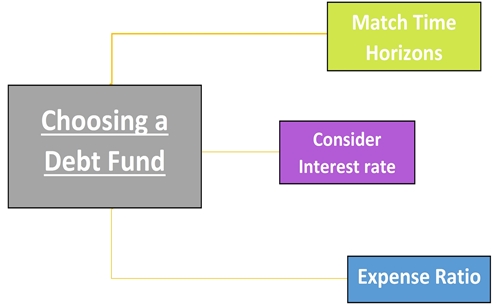
Expense Ratio
An important factor to be considered in debt funds is its expense ratio. A higher expense ratio creates a larger impact on the funds' performance. For example, liquid funds have the lowest expense ratios which are up to 50 bps (BPS is a unit to measure interest rates wherein one bps is equal to 1/100th of 1%) Whereas, other debt funds could charge up to 150 bps. So to make a choice between one debt mutual fund, it is important to consider the management fee or the fund running expense.
Debt Fund Taxation
Tax implication on debt funds is computed in the following manner-
Short Term Capital Gains
If the holding period of a debt investment is less than 36 months, then it is classified as a short-term investment and these are taxed as per individual's tax slab.
Long Term Capital Gains
If the holding period of debt investment is more than 36 months, then it is classified as a long-term investment and is taxed at 20% with an indexation benefit.
| Capital Gains | Investment Holding Gains | Taxation |
|---|---|---|
| Short Term Capital Gains | Less than 36 months | As per individual's tax slab |
| Long Term Capital Gains | More than 36 months | 20% with indexation benefits |
Debt Fund Vs FD
Usually, Fixed Deposits (FDs) are preferred over any market linked investments. This is mainly due to the assured returns and the security of investment they provide. However, debt mutual funds offer better returns with lower risks (for instance, short-term and ultra short-term funds). To understand in a better way, we will look at some of the major difference between these two avenues- debt funds and fixed deposits.
a. Taxation
The entire income in a fixed deposit is taxable at the slab rate applicable to an individual. But in debt funds, if you hold an investment for more than 36 months you are taxed at 20 percent with an indexation benefit of the cost.
b. Returns
FDs have a fixed rate of interest that you earn on your deposit, while debt funds don’t come with any such assured returns.
c. Tax Deduction at Source (TDS)
No TDS is deducted in hand of investors on returns in debt funds, but in FDs, if your interest exceeds INR 10,000 then it is subjected to TDS by the bank.
d. Liquidity
FDs can be redeemed in 1or 2 days’ notice, but typically it carries a penalty if redeemed before the maturity date. Debt funds also have exit load charges that are mostly levied for redemptions, typically up to three years. However, Liquid funds do not have nay exit load and even ultra-short term funds, if they do have an exit load, it is for a very short period.
Debt Funds Vs Equity Funds
While both funds- debt and equity- seek to deliver potential returns, understanding the differences between them will help investors in deciding a better investment plan based on their Asset Allocation and risk profile.
a. Tax liabilities
In Mutual Funds, taxes are held differently fund to fund and duration for which the fund is held. In terms of Equity Funds and debt funds, the tax rate differs as per their holding period. The tax liable for each of these funds is mentioned below-
| Fund Type | Period of Holding | Tax Rate |
|---|---|---|
| Equity Funds | Short term (less than 1 year) | 15% (with no indexation) |
| - | Long term (more than 1 year) | 10% |
| Debt Funds | Short term (Less than or equal to 3 years) | Personal Income Tax rate |
| - | Long Term (More than 3 years) | 20% (after indexation) |
*For FY 2018
b. Risks
Since equity funds invest in shares and stocks, they carry higher risks compared to debt funds. Debt mutual funds have a lower risk attribute as they invest in fixed income instruments.However, debt funds are subject to interest rate movements. If there is a large movement of interest rates, then even debt funds (mainly long -term debt funds) can show large losses. Investors need to clearly take into consideration their risk profile including their tenor of investment and ability to tolerate losses before getting into debt funds.
c. Returns
As equity funds invest in shares there is a higher probability for better returns compared to debt funds. But at the same time, the risk involved in an equity fund is also higher than debt funds.
Make a SIP Investment in Debt Funds
Most investors associate SIP (Systematic Investment Plan) with equity funds. However, investors can also invest in debt mutual funds via SIP- a much more disciplined way to invest. Taking a SIP route in debt mutual funds allow investors to manage market volatility. Furthermore, a SIP will help investors to diversify funds consistently, which will also inculcate a regular savings habit.
But, SIP investments in debt mutual funds are advisable for longer duration funds like income funds or gilt funds, which are more volatile in nature over short-term funds like liquid and ultra short-term funds.
- SIP in a debt fund is advisable for a long term investment plan.
- SIP in a debt fund is better alternatives to an RD and FD.
- SIP in a debt fund is suggested for investors who can take moderate to high risk since there is the risk in the underlying investment.
Best Debt Funds in India 2020
Fund NAV Net Assets (Cr) 3 MO (%) 6 MO (%) 1 YR (%) 3 YR (%) 2024 (%) Debt Yield (YTM) Mod. Duration Eff. Maturity Axis Credit Risk Fund Growth ₹22.5247
↑ 0.01 ₹363 1.6 4 8.9 8 8.7 8.64% 2Y 3M 14D 2Y 8M 1D PGIM India Credit Risk Fund Growth ₹15.5876
↑ 0.00 ₹39 0.6 4.4 8.4 3 5.01% 6M 14D 7M 2D UTI Banking & PSU Debt Fund Growth ₹22.7796
↑ 0.00 ₹1,078 1 2.8 7.4 7.5 7.8 7.04% 1Y 1M 10D 1Y 2M 19D Aditya Birla Sun Life Savings Fund Growth ₹571.125
↑ 0.10 ₹22,857 1.3 3 7.1 7.4 7.4 6.81% 5M 19D 6M 11D HDFC Banking and PSU Debt Fund Growth ₹23.8057
↑ 0.01 ₹5,620 0.7 2.8 7.1 7.3 7.5 7.26% 3Y 1M 17D 4Y 5M 1D Aditya Birla Sun Life Money Manager Fund Growth ₹385.357
↑ 0.06 ₹28,816 1.4 2.9 7.1 7.5 7.4 6.62% 6M 11D 6M 11D ICICI Prudential Long Term Plan Growth ₹38.1879
↑ 0.04 ₹14,826 1.2 3.2 7 7.7 7.2 7.82% 5Y 8M 26D 13Y 6M 14D HDFC Corporate Bond Fund Growth ₹33.6286
↑ 0.01 ₹33,207 0.6 2.8 6.9 7.7 7.3 7.36% 4Y 5M 19D 7Y 8M 16D Aditya Birla Sun Life Corporate Bond Fund Growth ₹116.779
↑ 0.07 ₹28,253 0.7 3.1 6.9 7.7 7.4 7.12% 4Y 10M 24D 7Y 6M 14D Indiabulls Liquid Fund Growth ₹2,623.14
↑ 0.46 ₹169 1.5 2.9 6.4 6.9 6.6 6.62% 1M 1M Note: Returns up to 1 year are on absolute basis & more than 1 year are on CAGR basis. as on 27 Feb 26 Research Highlights & Commentary of 10 Funds showcased
Commentary Axis Credit Risk Fund PGIM India Credit Risk Fund UTI Banking & PSU Debt Fund Aditya Birla Sun Life Savings Fund HDFC Banking and PSU Debt Fund Aditya Birla Sun Life Money Manager Fund ICICI Prudential Long Term Plan HDFC Corporate Bond Fund Aditya Birla Sun Life Corporate Bond Fund Indiabulls Liquid Fund Point 1 Bottom quartile AUM (₹363 Cr). Bottom quartile AUM (₹39 Cr). Lower mid AUM (₹1,078 Cr). Upper mid AUM (₹22,857 Cr). Lower mid AUM (₹5,620 Cr). Top quartile AUM (₹28,816 Cr). Upper mid AUM (₹14,826 Cr). Highest AUM (₹33,207 Cr). Upper mid AUM (₹28,253 Cr). Bottom quartile AUM (₹169 Cr). Point 2 Established history (11+ yrs). Established history (11+ yrs). Established history (12+ yrs). Established history (22+ yrs). Established history (11+ yrs). Established history (20+ yrs). Established history (16+ yrs). Established history (15+ yrs). Oldest track record among peers (29 yrs). Established history (14+ yrs). Point 3 Top rated. Rating: 5★ (top quartile). Rating: 5★ (upper mid). Rating: 5★ (upper mid). Rating: 5★ (upper mid). Rating: 5★ (lower mid). Rating: 5★ (lower mid). Rating: 5★ (bottom quartile). Rating: 5★ (bottom quartile). Rating: 5★ (bottom quartile). Point 4 Risk profile: Moderate. Risk profile: Moderate. Risk profile: Moderate. Risk profile: Moderately Low. Risk profile: Moderately Low. Risk profile: Low. Risk profile: Moderate. Risk profile: Moderately Low. Risk profile: Moderately Low. Risk profile: Low. Point 5 1Y return: 8.90% (top quartile). 1Y return: 8.43% (top quartile). 1Y return: 7.44% (upper mid). 1Y return: 7.15% (upper mid). 1Y return: 7.13% (upper mid). 1Y return: 7.07% (lower mid). 1Y return: 6.99% (lower mid). 1Y return: 6.94% (bottom quartile). 1Y return: 6.92% (bottom quartile). 1Y return: 6.36% (bottom quartile). Point 6 1M return: 1.14% (top quartile). 1M return: 0.27% (bottom quartile). 1M return: 0.68% (lower mid). 1M return: 0.62% (lower mid). 1M return: 0.84% (upper mid). 1M return: 0.62% (bottom quartile). 1M return: 0.90% (upper mid). 1M return: 0.92% (upper mid). 1M return: 0.99% (top quartile). 1M return: 0.56% (bottom quartile). Point 7 Sharpe: 2.08 (upper mid). Sharpe: 1.73 (upper mid). Sharpe: 1.05 (lower mid). Sharpe: 2.17 (top quartile). Sharpe: 0.36 (bottom quartile). Sharpe: 1.91 (upper mid). Sharpe: 0.37 (lower mid). Sharpe: 0.24 (bottom quartile). Sharpe: 0.22 (bottom quartile). Sharpe: 2.72 (top quartile). Point 8 Information ratio: 0.00 (top quartile). Information ratio: 0.00 (top quartile). Information ratio: 0.00 (upper mid). Information ratio: 0.00 (upper mid). Information ratio: 0.00 (upper mid). Information ratio: 0.00 (lower mid). Information ratio: 0.00 (lower mid). Information ratio: 0.00 (bottom quartile). Information ratio: 0.00 (bottom quartile). Information ratio: -0.70 (bottom quartile). Point 9 Yield to maturity (debt): 8.64% (top quartile). Yield to maturity (debt): 5.01% (bottom quartile). Yield to maturity (debt): 7.04% (lower mid). Yield to maturity (debt): 6.81% (lower mid). Yield to maturity (debt): 7.26% (upper mid). Yield to maturity (debt): 6.62% (bottom quartile). Yield to maturity (debt): 7.82% (top quartile). Yield to maturity (debt): 7.36% (upper mid). Yield to maturity (debt): 7.12% (upper mid). Yield to maturity (debt): 6.62% (bottom quartile). Point 10 Modified duration: 2.29 yrs (lower mid). Modified duration: 0.54 yrs (upper mid). Modified duration: 1.11 yrs (upper mid). Modified duration: 0.47 yrs (top quartile). Modified duration: 3.13 yrs (lower mid). Modified duration: 0.53 yrs (upper mid). Modified duration: 5.74 yrs (bottom quartile). Modified duration: 4.47 yrs (bottom quartile). Modified duration: 4.90 yrs (bottom quartile). Modified duration: 0.08 yrs (top quartile). Axis Credit Risk Fund
PGIM India Credit Risk Fund
UTI Banking & PSU Debt Fund
Aditya Birla Sun Life Savings Fund
HDFC Banking and PSU Debt Fund
Aditya Birla Sun Life Money Manager Fund
ICICI Prudential Long Term Plan
HDFC Corporate Bond Fund
Aditya Birla Sun Life Corporate Bond Fund
Indiabulls Liquid Fund
Conclusion
Debt funds are one of the best ways to invest your money and generate low-risk income on a regular basis. But, before investing in debt funds one should carefully consider their risk appetite and then look into the relevant debt fund to invest in. Additionally, one should look at the category of the debt fund, its respective maturity period and credit profile before investing. A better decision could lead to a better investment
All efforts have been made to ensure the information provided here is accurate. However, no guarantees are made regarding correctness of data. Please verify with scheme information document before making any investment.
